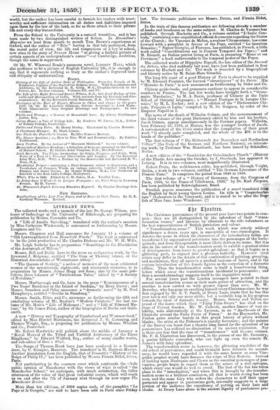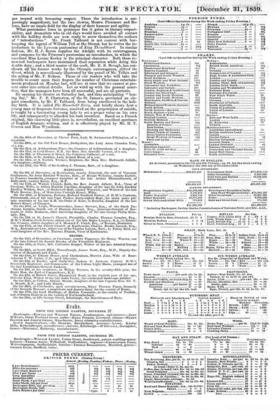Z#t S#tatrti.
The Christmas pantomimes of the present Year have two points in com- mon: they are all distinguished by the splendour of their ." trans- formation scenes," and likewise by allusions to the rifle volunteers as the best representatives of British patriotism and valour.
"Transformation scene !" This word, which was utterly without significance a dozen years ago, is susceptible of two etymologies. It denotes the scene in which the characters of the introductory fables are transformed by supernatural potentates into the personages of the hark- quinade, and from this operatictn it most likely derives its name. But it is also in the nature of the transformation scene to exhibit a gradual series of developments from lesser to greater splendour; so that it begins as a glittering grub, to expand into a glorious butterfly. However rival artists may differ in the details of this combination of painting, grouping, and mechanism, they all agree in a gradual increase of lustre, and in the copious introduction of live female figures as the caryotids of a fantastic edifice. Thus the transformation scene is itself a transforming thing, before which occur the transformations incidental to pantomime ; and thus a second etymology suggests itself to the inquisitive mind. For several years past the London managers have pointed to their several transformation scenes as their main points of attraction, and the practice is now carried on with greater vigour than ever. Mr. W. Beverley, who has gone on excelling himself every Christmas since he was first engaged by Mr. E. T. Smith, of Drury Lane, trusts that he has this year taken not only one more stride, but a veritable leap in his progress towards the ideal of fantastic beauty.. Messrs. Grieve and Telbin are proud of the lustre which their "Fairy Palm Grove" has shed on the stage of Covent Garden. Mr. W. Callcott, another limner of vast ce- lebrity, toils alliteratively at the Lyceum, in an "Apotheosis of the Chrysolis around the Fairy Ferns of Fancy." At the Haymarket, Mr. Fenton gains similar laurels in this grand lottery of prizes without blanks ; the artist at the Priiteess's is equally fortunate ; and the painter of the Surrey can boast that a theatre long famed for the splendour of its pantomimes has suffered no diminution of its ancient reputation. Nor is there any fear that the race of " transformers " will become extinct. Mr. F. B. Chatterton has discovered, in the person of one Mr. Coventry, a genius hitherto concealed, who can light up even the remote St. James's with fairy splendour. The transformation scene is, however, the glittering sepulchre of the old school of pantomime, and could Grimaldi have foreseen its ascend- ancy, he would have regarded it with the same horror as some Viso- gothic prophet would have foreseen the reign of Don Roderic. Instead of looking upon Harlequin and Clown as the essential personages of pan- tomime, people begin to regard them as the actors of a dull epilogue, which every one would do well to avoid. The best of the fun has taken place in the "introduction," and when this is brought by the transfor- mation scene to a brilliant conclusion, all that is worth seeing has been seen, and the same fairy who orders the characters to doff their upper garments and appear in pantomime garb, internally suggests to a large portion of the audience the expediency of putting on their hats and cloaks. At Drury Lane alone is the ancient dignity of pantomime pro-
per treated with becoming respect. There the introduction is sur- passingly magnificent, but the two clowns, Messrs. Flexmore and Bo- leno, have an ample field for the display of their humour and agility.
What pantomime loses in grotesque fun it gains in literary respect- ability, and dramatists who in old days would have avoided all contact with the holiday drolls are now ready to avow themselves the authors of "introductions." Mr. Frank Talfotud is not content with bur- lesquing the legend of William Tell at the Stiund, but he writes the in- troduction to the Lyceum pantomime of King Thrushbeard. In similar fashion, Mr. H. J. Byron supplies the Adelphi with its extravaganza, and composes for the Princess's pantomime an introduction, in which the excellent Miss Louise Keeley is the principal character. Both these re- nowned burlesquers have maintained their reputation while doing this double duty ; and a third master of the craft, Mr. R. B. Brough, has out- shown all his former works by the Olympic extravaganza, Alfred the Great, which is marvellously illustrated by the pencil of Mr. Telbin and the acting of Mr. F. Robson. Those of our readers who will take the trouble to count upon their fingers the number of Christmas entertain- ments produced on Monday last, will see at once that we cannot at pre-. sent enter into critical details. Let us wind up with the general asser- tion, that the managers have been all successful, and are all patriotic. By opening his theatre on Saturday last, and thus anticipating "box- ing day," Mr. F. 13. Chatterton, of the St. James's, prevented an ele- gant comedietta, by Mr. F. Talfourd, from being smothered in the holi- day birth. It is called The Household Fairy, and briefly shows how a young man of desperate fortunes, resolved on the perpetration of suicide, is taught by a fascinating young lady. to set a proper value on his own life, and consequently to abandon his rash intention. Based on a French original, this cnarming little piece is, nevertheless, an excellent specimen of English dramatic writing, and it is effectively played by Mr. H. T. Craven and Miss Wyndham.



























 Previous page
Previous page